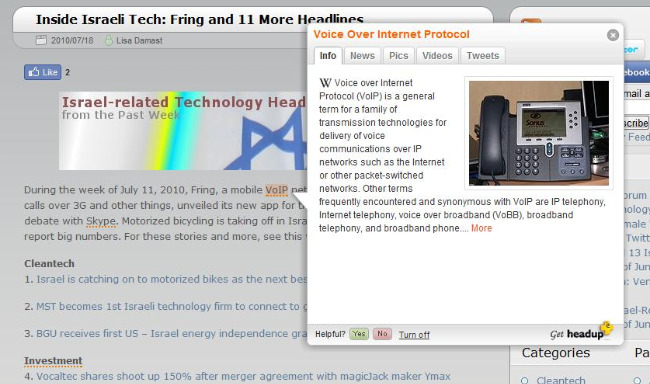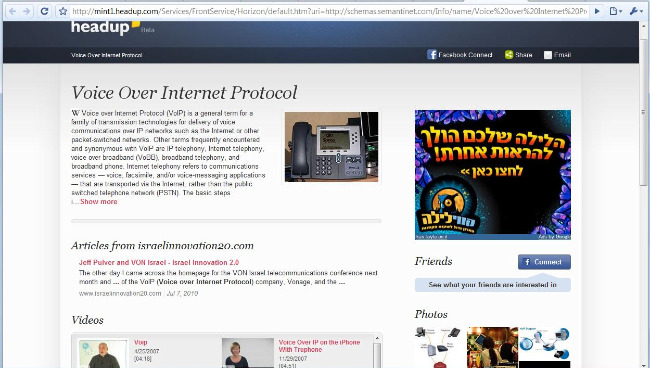The Jerusalem Post, the main daily English Israeli newspaper, has implemented SemantiNet’s Headup application and is currently running a pilot with it. At first glance, Headup, which has been added to this blog too, seems to be potentially another annoying widget that will underline certain keywords (that may or may not be relevant) and include a pop up when the word is clicked on.
Offering three different linking options – tabs, snippet, and link – SemantiNet takes the idea of information gathering to a different level though. The tab option, includes, when it pops up, a description of the word or phrase from Wikipedia, along with other tabs for news related to that word from that site and other sites, photos, videos, Tweets and anything else that is relevant to the link, giving viewers the chance to see the word in real-time.

The snippet includes a description, a picture and related articles, while the link option is just a link to a page. Not just any page though. It is a page that gathers all the information that was in the tab option and displays it on one page (see below). When the settings are set to link, viewers who would click on a highlighted word are taken to a page on the Headup domain with all that information, plus a way to see what friends are interested in via Facebook Connect and an advertisement on the side.

In the case of the JPost, the topic pages stay on the JPost domain. Called the JPostPedia, the JPost’s intention is to create the ultimate source of information related to Israel and the Middle East using these pages.
The “authoritative source of information on a wide variety of topics relating to Israel and the Middle East” as Shai Tsur of Giza Venture Capital, which is invested in the company, puts it in his post on this. Such a source signifies a change in the content generation, aggregation and distribution game.
By utilizing Headup, news sites provide their readers with a more complete context as well as an easy way to consume additional content. By creating topic pages, publishers can essentially unearth archived material that users would not generally think to look for and present it to their users within a particular and more complete context. Users get more information about the articles they are reading and sites get more pageviews and provide a better user experience.”
It also gives publishers more pages to monetize. In the case of blogs, such as this one, it can offer visitors a chance to find/discover additional relevant content on this site and other sites. In addition, there is an option to have publisher content syndicated.
All this related to the topic pages leads to the question, except for wikipedia, are most wikis about to become obsolete? Share your thoughts in the comments below.
::BloGiza
Related Posts:
Web 2.0, the Live Web and SemantiNet
Conduit conveys your information to viewers
Thoughts on TechAviv and Outbrain’s recent $12 million B round







